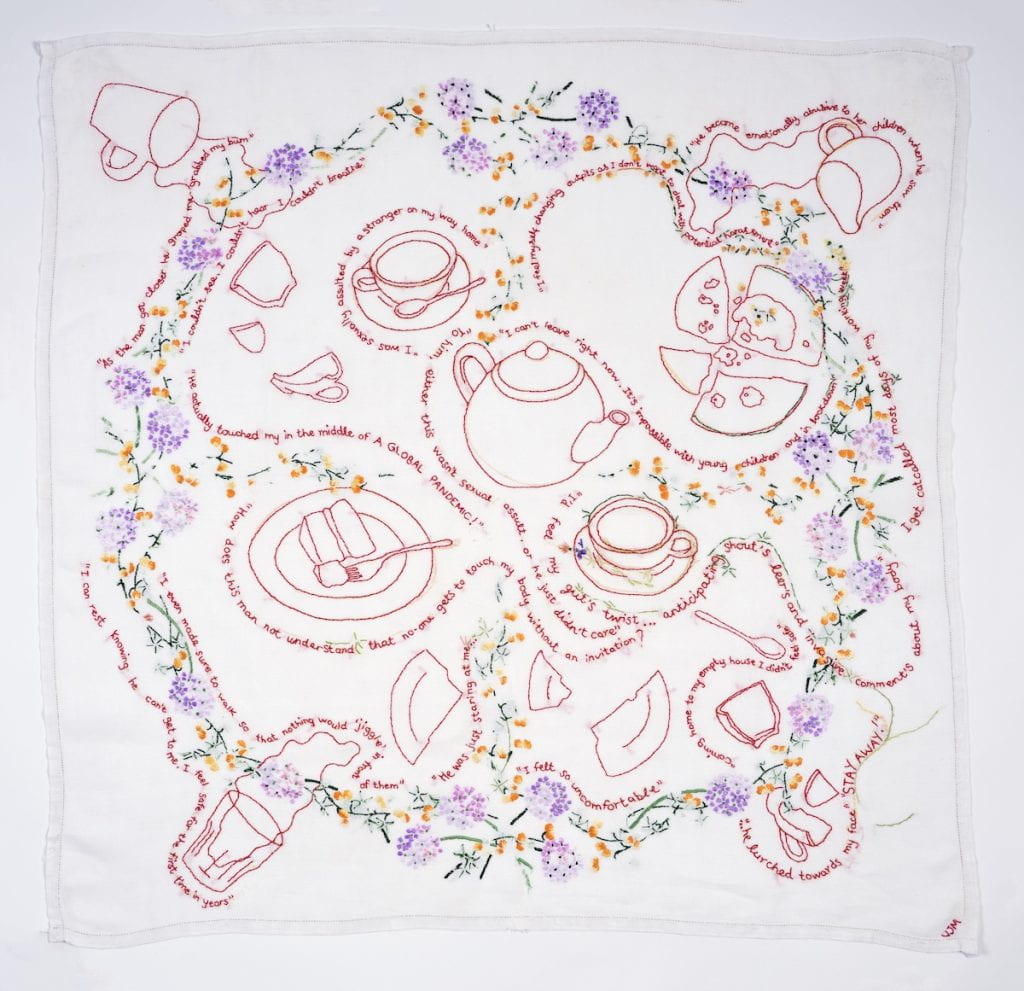The Tea Party [La tertulia del té]
Vanessa Marr bordó un mantel antiguo y lo extendió para compartir un té con un pastelillo, creando un escenario doméstico familiar subvertido para contar las historias de aquellos quienes han sufrido la violencia de género. Su método de cosido a mano hace eco del legado bordado del desempoderamiento femenino (Parker, 1984) y de las voces de protesta femenina a través del bordado en tiempos recientes (Greer, 2014), todo enmarcado en una escena cotidiana donde se les da voz a estas. La mesa está dispuesta con bordados que representan la parafernalia típica de la hora del té, incluyendo pastelillos y vajilla, con algunas piezas derramadas o rotas para simbolizar la violencia. Citas directas de las mujeres que fueron entrevistadas se dispersan en torno a la vajilla, dentro de un contexto que es tanto seguro como impactante. Esta obra también se inspira en la famosa obra de Judi Chicago, Dinner Party [Cena tertulia] (1979), que presenta una mesa puesta en honor de los logros de mujeres célebres. Al brindarles una silla a las participantes de este proyecto, Marr ha empoderado a cada una de ellas, otorgándoles el control sobre sus narrativas personales.
Roszita Parker, The Subversive Stitch (Tauris & Co. Ltd, 1984).
Betsy Greer, Craftivism: The Art and Craft of Activism (Arsenal Pulp Press, 2014).
The Tea Party
Vanessa Marr has embroidered a vintage tablecloth, laid out for tea and cake, as a familiar domestic landscape subverted to tell the stories of those who have experienced gender-based violence. Her method of hand-stitch references the embroidered legacy of female disempowerment (Parker, 1984), and more recently women’s voices of protest through stitch (Greer, 2014), within a commonplace occasion where stories are often told. The table settings include embroidered drawings of the typical teatime paraphernalia of crockery and cake, some of which are tipped over or broken to suggest violence. Direct quotes from the women who were interviewed for this project meander around the crockery, in a context that is at once both safe and shocking. This work also sits within the context of Judy Chicago’s famous Dinner Party (1979), which set a table for famous women to highlight their achievements. By giving the project participants a seat at her table, Marr has empowered each woman, placing them in control of their personal narratives.
Roszita Parker, The Subversive Stitch (Tauris & Co. Ltd, 1984).
Betsy Greer, Craftivism: The Art and Craft of Activism (Arsenal Pulp Press, 2014).

Acerca de la artista
Vanessa Marr es una artista y académica radicada en Sussex Oriental, Inglaterra. Es miembro de la Real Sociedad de las Artes (RSA por sus siglas en inglés) y actualmente es profesora principal y encargada de curso en la Universidad de Brighton. Su trabajo se fundamenta en la teoría del diseño visual y en un proceso de enfoque intuitivo y físico, que explora principalmente mediante el bordado a mano y la escritura creativa. Se siente atraída por la vestimenta como un medio que comprende el legado del denominado “trabajo de las mujeres” y su potencial subversivo y activismo silencioso. Vanessa ha publicado internacionalmente en torno al tema de la relación de la mujer con lo doméstico, la autoetnografía y el dibujo como práctica de investigación creativa. Participa con regularidad en proyectos de investigación colaborativos y creativos, y nunca deja de aprender, crear y escribir.
About the artist
Vanessa Marr is an artist and academic based in East Sussex, England. She is a Fellow of the Royal Society of Arts (RSA) and is currently Principal Lecturer and Course Leader at the University of Brighton. Her work is underpinned by visual design-theory and process that embraces an intuitive and physical approach, which she explores predominantly through hand-stitch and creative writing. She is drawn to cloth as a medium that holds the legacy of so-called women’s work and its potential for subversion and quiet activism. Vanessa has published internationally on the theme of women’s relationship with domesticity, autoethnography and drawing as creative research practice. She regularly participates in collaborative, creative and research projects, and never stops learning, making and writing.